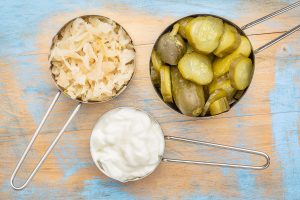 Should seniors take psychobiotics for brain health? If you’re not sure what “psychobiotics” are, don’t worry. It’s a new term for probiotic bacteria that have a beneficial effect on our moods and cognition.
Should seniors take psychobiotics for brain health? If you’re not sure what “psychobiotics” are, don’t worry. It’s a new term for probiotic bacteria that have a beneficial effect on our moods and cognition.
Taking daily probiotics supplements and eating fermented and fiber-rich prebiotic food is a good idea for senior health. (Pictured here is sauerkraut, natural yogurt, and pickles, all examples of fermented food.)
Not only does this make sense for good digestion and our immune system, but a healthy balance of bacteria in the intestines exerts a major influence on the brain.
The bacteria that improve our mood and cognitive functions are called psychobiotics. Professor Ted Dinan of University College Cork in Ireland, one of the pioneers in the field, introduced the term psychobiotics in 2012 to describe the specific bacteria that result in beneficial effects on mood, motivation, and cognition.
Don’t Take My Advice
To be clear, this is my conclusion based on scientific research reports, and is not medical advice. I’m not a medical doctor. I’m a psychologist approaching 75 who has a keen interest in senior health. Especially since experiencing irritable bowel syndrome this year.
It seems some doctors are at a loss when it comes to helping gut problems not caused by germs, parasites, or amoeba. They prescribe medications to treat each symptom (diarrhea, constipation, bloating, cramps) without regard to their affect on our natural gut flora.
They give you a prescription for antibiotics if you have any bad bugs, one for cramping and bloating, one for diarrhea, or constipation, one for intestinal motility, one for heartburn and maybe one for GERD, gastrointestinal reflux.
Irritable Bowel Syndrome and the Brain
Irritable bowel syndrome (IBS) is a group of symptoms—including abdominal pain and changes in the pattern of bowel movements without any evidence of underlying damage. There are those who experience constipation and diarrhea, and some who experience both.
It is estimated that 10 to 25% of adults have IBS. And of those, 90% also complain of mood disorders, notably anxiety and depression. It’s hard to ignore the link between gut bacteria problems (dysbiosis) and anxiety and depression.
I had taken several courses of wide-spectrum antibiotics in the last year, and also experienced mild anxiety and depression. I decided to try to repopulate my gut bacteria through diet and probiotic supplements. I’m hoping to find the right strains of bacteria that would work as psychobiotics for brain health.
Pre-, Pro-, and Psychobiotics for Brain Health
Probiotics: First I had to understand what probiotics are. These bacteria are found in food such as yogurt and other fermented foods. There are two main species found in supplements, Bifobacterium and Lactobacillus. You can find various strains of these two in most of the supplements on the market.
Prebiotics: Then, I discovered that in order to keep the bacteria in your gut long enough for them to establish a colony, you need to feed them prebiotics, the food they use which is soluble fiber.
Prebiotics are compounds in food that induce the growth or activity of beneficial microorganisms such as bacteria and fungi. The most common example is in the gastrointestinal tract, where prebiotics can alter the composition of organisms in the gut microbiome.
Dietary prebiotics are typically fiber compounds that pass undigested through the upper part of the gastrointestinal tract and stimulate the growth and activity of advantageous bacteria that colonize the large bowel.
Bacteria, Your Gut and Your Brain
Why does our gut bacteria get out of whack in the first place? Anyone who has stayed alive long enough to be a senior has been exposed to diseases and treated with broad-spectrum antibiotics. Some seniors have had recurrent antibiotics for various maladies, including dental surgeries. Not only do our gut flora decrease with age, they get wiped out every time we take antibiotics.
Sometimes we get them back by eating yogurt. But much of the yogurt on the market isn’t actually beneficial. Processing and adding sugar to yogurt may mean there are no live bacteria as part of the ingredients. When you buy yogurt, read the label, make sure there are live bacteria and no added sugar. To be safe, it may be necessary to take probiotic supplements long enough to get your gut bugs back a healthy population.
Bugs and Mental Health
This discovery of how important our gut bacteria are to our brains may revolutionize the way we treat mood disorders such as depression and anxiety. More human trials are necessary; so far, there have been promising results on mice.
Germ free mice are a special breed raised for the purpose of scientific experiments. They suffer depression, anxiety and mood disorders. When fed probiotics, they regain better mood, motivation and cognitive function. Human trials are in process. Many have shown the same improvements for humans.
Currently we treat common psychiatric disorders by targeting neurotransmitter systems within the brain (serotonin-reuptake inhibitors like Prozac, for example). But what if we could administer bacteria in order to affect the brain through the gut-brain axis? This approach might have fewer side effects than psychotropic medications.
It’s all food for thought – or rather bacteria for brain-boosting benefits.
Like much of what I share with you, these topics are cutting edge research that is still being discovered. This blog post reports material from authors Scott C. Anderson, John F. Cryan, and Ted Dinan in The Psychobiotic Revolution, Mood, Food, and the New Science of the Gut-Brain Connection.
If you’d like to get the latest research and ideas in senior health and the War on Aging, please subscribe using the form on this page. We’ll send you an email digest weekly.

Recent Comments